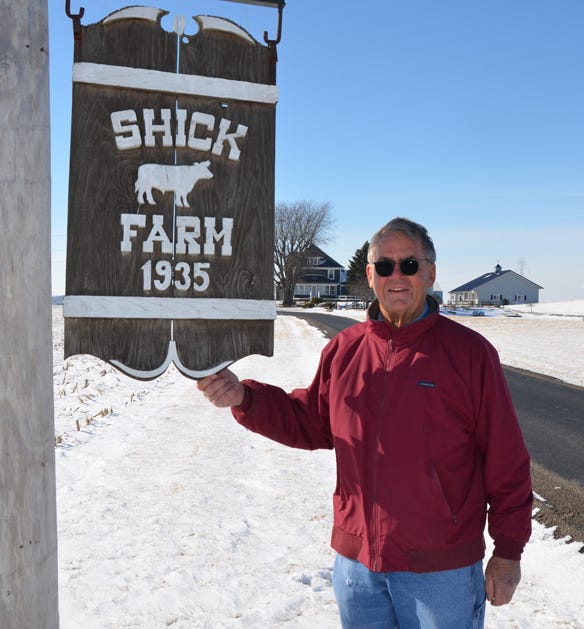
Gary Shick’s early focus was on saving the soil, but his stewardship of the land has gotten much broader and more intense through the years. He’s adopted cover crops, installed waterways and concentrated his chemistries where they’re needed the most.
Gary was honored as a 2018 Ohio Master Farmer during the Ohio Conservation Tillage and Technology Conference on March 6 in Ada.
He started out farming about 600 acres with his dad. Three years after marrying his wife, Darlene, in 1969, Gary bought more land and now farms a little over 1,000 acres in Hardin County with his daughter, Molly.
The same year they married, Gary started no-tilling, and has now been 100% no-till for 35 years. There are pieces of the farm that have been consistently no-tilled for 50 years, and the Shick farm has hosted numerous field days to try and encourage other farmers to pick up the practice. His goal is to help others and prevent someone else from making the mistakes he did — to share the good and the bad.
“Gary has been active with the Ohio No-Till Council for about 20 years and serves on the board of directors,” says Randall Reeder, a retired OSU Extension Agricultural Engineer who co-nominated Dale for the award with Jan Layman, a 2016 Master Farmer from Hardin County. “He is always willing to share what he has learned with no-till. His daughter, Molly, a Certified Crop Adviser, shares her knowledge of conservation agriculture with her clients.”
Starting with no-till
After attending a field day in Knox County, Gary and his “open minded” father decided to try no-till in 1969.
“The first year of no-till, we double cropped soybeans behind wheat," he says. "We tip-toed through about 100 acres more the next year until we were all no-till.”
No-till takes patience, Gary says, adding that he’s not the first one to get started planting and not the first one to get done, and that doesn’t bother him.
He was the Hardin County Soil and Water Conservation supervisor for six years, and has worked extensively with the county and other farmers.
 STEWARDSHIP FIRST: Gary Shick has been no-tilling ground for 50 years, including 35 years 100% on his farm in Kenton.
STEWARDSHIP FIRST: Gary Shick has been no-tilling ground for 50 years, including 35 years 100% on his farm in Kenton.

Working with NRCS, Gary and Molly have added filter strips and reshaped every waterway in last three years, and even added a few new ones.
Molly, who also worked with the NRCS and Extension, helped pilot the Indian Lake Watershed project, and has done the grid and soil sampling on the farm for 25 years, which allows for variable rate fertilizer applications.
Gary used cover crops in the early '70s but got away from that for some time, until resuming it in 2005 through NRCS incentives.
His cover crop program started with a three-year cost-share program with NRCS. “When that was up, and it was coming out of my own pocket, I had to decide if I was going to continue; the answer was yes,” he says.
They are currently using cereal rye, drilling about half and aerial seeding the other half, following corn and soybeans.
Up until about 10 years ago, the farm was non-GMO. “We had some weed problems that we couldn’t solve, so we went to some Roundup Ready corn,” Gary says. But they also grow non-GMO tofu beans and food grade corn.
Molly says her dad is very conscientious of the land and the environment. She plants the beans, scouts the fields and overlays yield maps with grid soil samples, while her dad plants the corn and drives the self-propelled sprayer.
Growing up, Gary raised livestock through FFA and 4-H. At that time the farm included a farrow to finish hog operation and some beef cattle. “As a youngster, I hated farm work as I saw it as chores,” he says. “But now it’s my passion. I was lucky that I had a dad that was receptive to new ideas. He let me try some things. Young farmers may start out looking at it as a job, and that’s OK. But, eventually it has to be a passion, even with depressed prices. You have to pay attention to the little things to make the big picture work.”
About the Author(s)
You May Also Like






